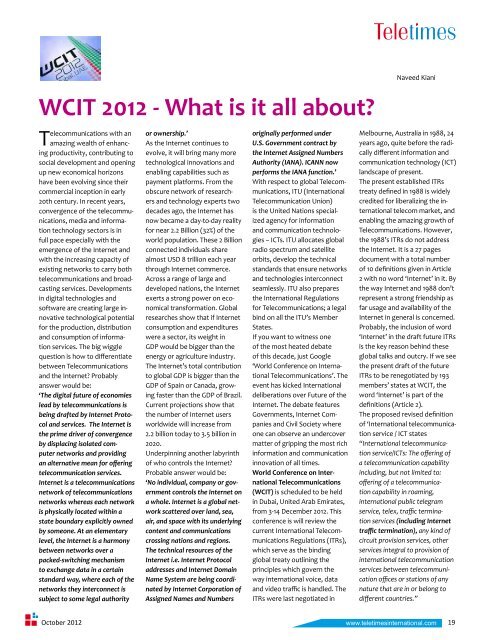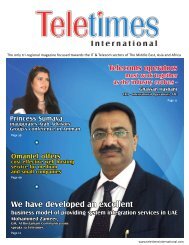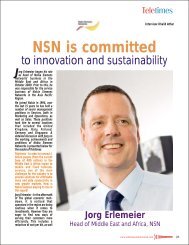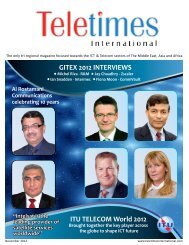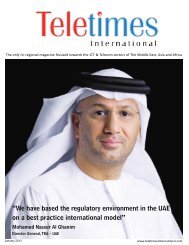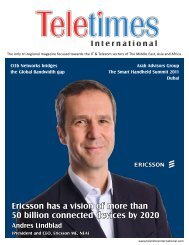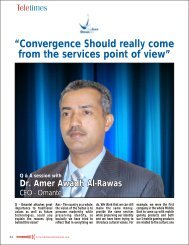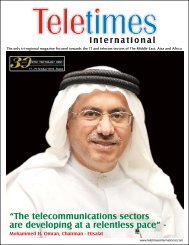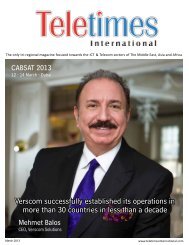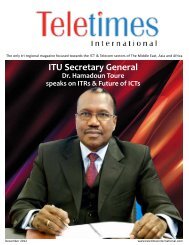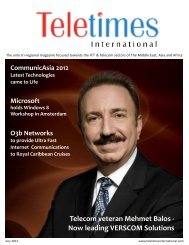Create successful ePaper yourself
Turn your PDF publications into a flip-book with our unique Google optimized e-Paper software.
WCIT <strong>2012</strong> - What is it all about?Telecommunications with anamazing wealth of enhancingproductivity, contributing tosocial development and openingup new economical horizonshave been evolving since theircommercial inception in early20th century. In recent years,convergence of the telecommunications,media and informationtechnology sectors is infull pace especially with theemergence of the Internet andwith the increasing capacity ofexisting networks to carry bothtelecommunications and broadcastingservices. Developmentsin digital technologies andsoftware are creating large innovativetechnological potentialfor the production, distributionand consumption of informationservices. The big wigglequestion is how to differentiatebetween Telecommunicationsand the Internet? Probablyanswer would be:‘The digital future of economieslead by telecommunications isbeing drafted by Internet Protocoland services. The Internet isthe prime driver of convergenceby displacing isolated computernetworks and providingan alternative mean for offeringtelecommunication services.Internet is a telecommunicationsnetwork of telecommunicationsnetworks whereas each networkis physically located within astate boundary explicitly ownedby someone. At an elementarylevel, the Internet is a harmonybetween networks over apacked-switching mechanismto exchange data in a certainstandard way, where each of thenetworks they interconnect issubject to some legal authorityor ownership.’As the Internet continues toevolve, it will bring many moretechnological innovations andenabling capabilities such aspayment platforms. From theobscure network of researchersand technology experts twodecades ago, the Internet hasnow became a day-to-day realityfor near 2.2 Billion (32%) of theworld population. These 2 Billionconnected individuals sharealmost USD 8 trillion each yearthrough Internet commerce.Across a range of large anddeveloped nations, the Internetexerts a strong power on economicaltransformation. Globalresearches show that if Internetconsumption and expenditureswere a sector, its weight inGDP would be bigger than theenergy or agriculture industry.The Internet’s total contributionto global GDP is bigger than theGDP of Spain or Canada, growingfaster than the GDP of Brazil.Current projections show thatthe number of Internet usersworldwide will increase from2.2 billion today to 3.5 billion in2020.Underpinning another labyrinthof who controls the Internet?Probable answer would be:‘No individual, company or governmentcontrols the Internet ona whole. Internet is a global networkscattered over land, sea,air, and space with its underlyingcontent and communicationscrossing nations and regions.The technical resources of theInternet i.e. Internet Protocoladdresses and Internet DomainName System are being coordinatedby Internet Corporation ofAssigned Names and Numbersoriginally performed underU.S. Government contract bythe Internet Assigned NumbersAuthority (IANA). ICANN nowperforms the IANA function.’With respect to global Telecommunications,ITU (InternationalTelecommunication Union)is the United Nations specializedagency for informationand communication technologies– ICTs. ITU allocates globalradio spectrum and satelliteorbits, develop the technicalstandards that ensure networksand technologies interconnectseamlessly. ITU also preparesthe International Regulationsfor Telecommunications; a legalbind on all the ITU’s MemberStates.If you want to witness oneof the most heated debateof this decade, just Google‘World Conference on InternationalTelecommunications’. Theevent has kicked Internationaldeliberations over Future of theInternet. The debate featuresGovernments, Internet Companiesand Civil Society whereone can observe an undercovermatter of gripping the most richinformation and communicationinnovation of all times.World Conference on InternationalTelecommunications(WCIT) is scheduled to be heldin Dubai, United Arab Emirates,from 3-14 December <strong>2012</strong>. Thisconference is will review thecurrent International TelecommunicationsRegulations (ITRs),which serve as the bindingglobal treaty outlining theprinciples which govern theway international voice, dataand video traffic is handled. TheITRs were last negotiated inNaveed KianiMelbourne, Australia in 1988, 24years ago, quite before the radicallydifferent information andcommunication technology (ICT)landscape of present.The present established ITRstreaty defined in 1988 is widelycredited for liberalizing the internationaltelecom market, andenabling the amazing growth ofTelecommunications. However,the 1988’s ITRs do not addressthe Internet. It is a 27 pagesdocument with a total numberof 10 definitions given in Article2 with no word ‘Internet’ in it. Bythe way Internet and 1988 don’trepresent a strong friendship asfar usage and availability of theInternet in general is concerned.Probably, the inclusion of word‘Internet’ in the draft future ITRsis the key reason behind theseglobal talks and outcry. If we seethe present draft of the futureITRs to be renegotiated by 193members’ states at WCIT, theword ‘Internet’ is part of thedefinitions (Article 2).The proposed revised definitionof ‘International telecommunicationservice / ICT states“International telecommunicationservice/ICTs: The offering ofa telecommunication capabilityincluding, but not limited to:offering of a telecommunicationcapability in roaming,international public telegramservice, telex, traffic terminationservices (including Internettraffic termination), any kind ofcircuit provision services, otherservices integral to provision ofinternational telecommunicationservices between telecommunicationoffices or stations of anynature that are in or belong todifferent countries.”<strong>October</strong> <strong>2012</strong>www.teletimesinternational.com19


